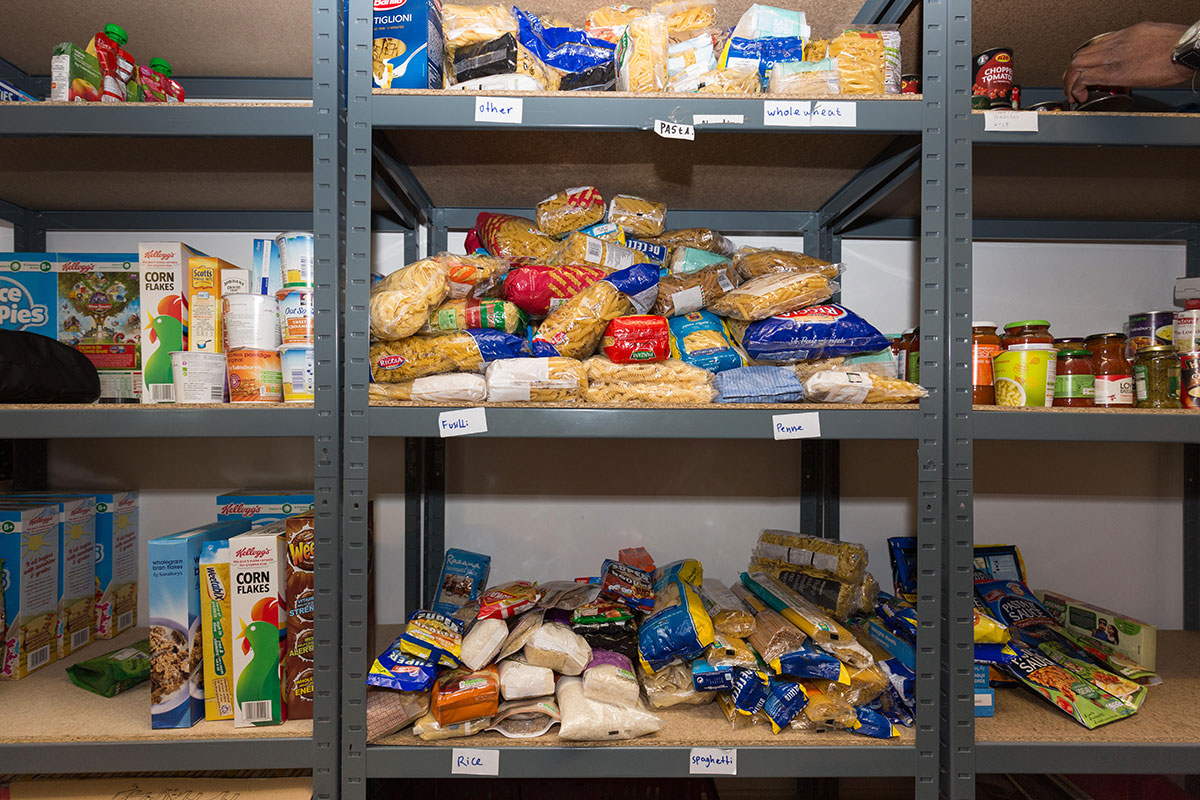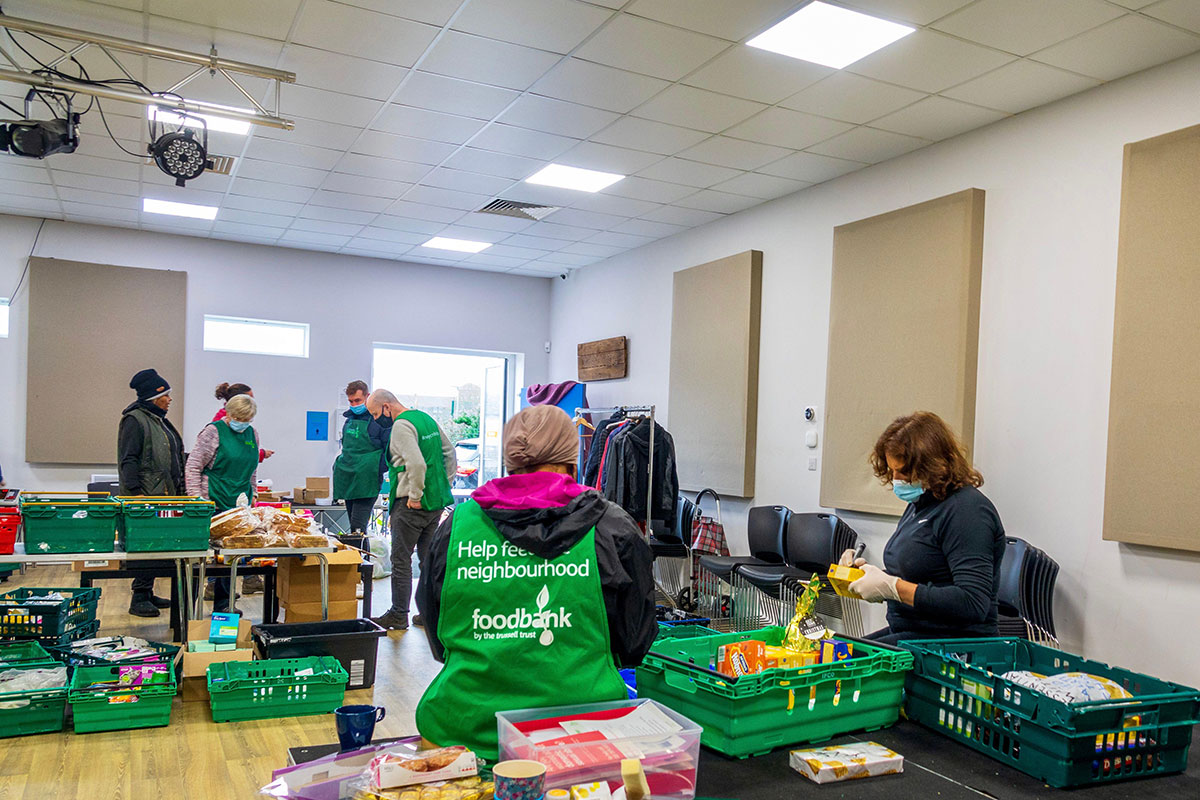How the cost of living crisis is affecting tenants
The rise in price of essentials such as food and heating impacts those in poverty most acutely. Social housing tenants will be hard hit, Darren Baxter finds

In association with:

Recently, news reports and parliamentary debates have been filled with discussion of the rising cost of living. The weekly food shop, heating our homes, filling up the car – the cost of meeting life’s essentials is increasing, and it’s affecting everyone.
This crisis affects those in poverty most acutely. Social housing tenants, who have the highest rate of poverty of any housing tenure, will be particularly hard hit.
Even before the price of essentials started rocketing, the warning lights were flashing. Destitution – the most acute form of poverty, where households lack essentials such as shelter, food, heating or basic toiletries, or have no or very low income – has been rising for a number of years. Research by the Joseph Rowntree Foundation (JRF) found that 2.4 million people were destitute at some point in 2019.
The Trussell Trust, the food bank provider, distributed 2.1 million food parcels to people in crisis between April 2021 and March 2022, up from 1.2 million between 2016 and 2017, an 81% increase in five years. Hospitalisation linked to being hungry has risen drastically in the past decade, with admissions primarily linked to malnutrition rising by 77% between 2009-10 and 2019-20.
Underpinning these data points are stories of people struggling to get by: pensioners using their bus passes to go on journeys because being on the bus is warmer than being at home, and parents trading off whether to give their kids a warm bath or have the heating on the following morning while they get ready for school.
The government has implemented a £150 rebate on council tax for those in the lowest four bands and a £200 discount on energy costs to come into effect in October. However, these measures are inadequate, poorly targeted and an insufficient replacement for proper action to ensure the incomes of those in poverty keep pace with the rising costs of essentials.
The Trussell Trust, the food bank provider, distributed 2.1 million food parcels to people in crisis between April 2021 and March 2022, up from 1.2 million between 2016 and 2017, an 81% increase in five years. Hospitalisation linked to being hungry has risen drastically in the past decade, with admissions primarily linked to malnutrition rising by 77% between 2009-10 and 2019-20.
Underpinning these data points are stories of people struggling to get by: pensioners using their bus passes to go on journeys because being on the bus is warmer than being at home, and parents trading off whether to give their kids a warm bath or have the heating on the following morning while they get ready for school.
The government has implemented a £150 rebate on council tax for those in the lowest four bands and a £200 discount on energy costs to come into effect in October. However, these measures are inadequate, poorly targeted and an insufficient replacement for proper action to ensure the incomes of those in poverty keep pace with the rising costs of essentials.
In numbers
81%
Increase in number of food parcels distributed between 2016-17 and 2021-22
2.4 million
People who were destitute at some point in 2019, according to research by JRF
They will be undermined by the prime minister and the chancellor’s choice to only increase benefits by 3.1% at a time when inflation is 7% and the Bank of England is predicting that it will reach 10% later this year.
This has resulted in the biggest fall in the real value of the basic rate of out-of-work benefits in 50 years. Families in poverty will be £445 worse off this year and 600,000 more people will be living in poverty, a quarter of them children. As food prices climb and the energy price cap increases again in October, it will most severely affect those with the least.
Meeting essential needs
The cost of living crisis begs a question about the ability of our social security system to ensure people can meet their essential needs, but there are longer-term challenges. A driver of the higher rates of poverty among social renters lies in the higher rates of unemployment and economic inactivity in their tenure. While work is not a silver bullet – in fact, the largest proportion of those in poverty are in work – it does have some impact in reducing it. Research from the Resolution Foundation and Clarion found the poverty rates of social renters moving into work in 2014 to 2015 fell from 68% to 31%.
So efforts to support people into work are valuable. Social housing has a greater proportion of carers, disabled people, people with dependent children and lone parents. This means that supporting access to work is not just about job searching, but also ensuring access to quality, flexible work and the support to maintain it.
A recent JRF project worked with people with experience of low-paid jobs to co-design ‘good work’, focused on the Employment Bill. Combining flexibility and certainty was key. It also recommended making flexible working the default from day one of employment, and reconsidering whether businesses should have exemptions that allow them to refuse such requests.
Action on climate change offers the opportunity to sustainably reduce households’ expenditure on energy. Government targets that all rented homes must meet Energy Performance Certificate Band C by 2030 will have a positive impact in reducing energy bills, alongside reducing emissions helping towards net zero targets.
Research published by Inside Housing suggests this could cost social landlords about £104bn. Against this price tag, the government’s commitment of £3.8bn over 10 years through the Social Housing Decarbonisation Fund looks insufficient. It is unsurprising, then, that many housing providers are concerned about the impact retrofitting could have on their organisation’s financial position. Without greater support, this could lead to trade-offs between greening their stock, building new homes and providing additional support, including that which could support tenants into employment.
Action on climate change could and should drive social benefits. A push to retrofit homes can drive household expenditure down, create jobs and training opportunities, and reduce carbon emissions. Social landlords could anchor this action.
Darren Baxter, senior policy advisor, JRF
‘As the fifth-largest economy in the world, a fifth of the population [of the UK] live in poverty’
As the fifth-largest economy in the world, the UK should be in a position where poverty is not an issue. Instead, we have one of the highest levels of inequality in the developed world – 14 million people, a staggering fifth of the population, live in poverty.
It doesn’t have to be this way. Extreme inequality and poverty are not inevitable. What we’re seeing now is a perfect storm of food and fuel poverty, high inflation, chronic housing shortages, insufficient benefits, and job and wage insecurity. This is only set to get worse, especially in light of further energy price hikes.
This downturn in living standards is even tougher because it comes on the back of over a decade of stagnating incomes. Policies like furlough protected household incomes from the huge falls in GDP during the pandemic, but we entered the pandemic with
wages no higher than before the 2008 financial crisis.
When governments choose to make tax fairer, invest in public services and housing, and ensure fair wages for everyone, the number of people in poverty drops. Reforms can result in a fairer, more equal world if economies centre around people rather than profit. We can boost the supply of genuinely affordable housing, ensure stable tenancies across the social and private rented sectors, support tenure status change, and invest in initiatives like Housing First to end homelessness. Allowing benefits to rise in line with prices would focus support on poorer households.
We need to invest in the fabric of our homes through a programme of eco-retrofitting, not only to fight climate change, but to support people having to choose between heating or eating. Half of England’s poorest families live in homes with cold, uninsulated walls. Were they to live in an equivalent insulated home, their heating bill would be £400 lower this winter. Yet we haven’t installed insulation at scale for a decade. We need to invest in clean energy and our own energy generation to lessen our reliance on global market price fluctuations.
Property services company Ian Williams will continue volunteering to add to the £75,000 donation we made in 2022 to support vital fundraising for organisations like More Than Homes. Ian Williams is, of course, proud to contribute. But as one of the world’s leading economies, why is the UK in such a tragic position?
Mike Turner, executive director, Ian Williams
‘Heating or eating, that’s the reality’
While The Trussell Trust laments the fact that it has to provide food banks at all, Accent Group highlights the benefits of partnering with local authorities and third-sector organisations and agencies, so that landlords can reach those in the greatest financial need
The Trussell Trust: food banks

In a perfect world, there would be no need for The Trussell Trust, a non-governmental organisation and charity that supports a nationwide network of food banks. Unfortunately, its services are in more demand than ever, says Chris Woo, the trust’s head of philanthropy and programme funding.
Between 1 April 2021 and 31 March 2022, the trust’s food banks provided more than 2.1 million parcels to people facing financial hardship across the country – a 14% increase compared to the same period in 2019-20, before the pandemic.
There is another starkly worrying statistic on top of that: more than 830,000 of these parcels were provided for children – a 15% increase from 2019-20.
The Trussell Trust does not have any specific research about the number of social housing residents that rely on food banks, but there is plainly a “huge crossover” between food bank users who are also social housing tenants, says Mr Woo. “We know that a lot of housing associations are referrers to our food banks up and down the country.”
With the £20 cut in Universal Credit last October, and the government rejecting calls for benefits to be brought in line with the current rate of inflation, it should be no surprise that food poverty has reached these alarming levels.
“We don’t use the term ‘food poverty’, we just call it ‘poverty’, because that’s the root cause. We know that a lack of income is the key driver for people who use food banks,” Mr Woo explains.
In numbers
£16bn
Value of benefits that are not claimed each year
2.1 million
Food parcels The Trussell Trust distributed in 2021-22
830,000
Number of these parcels which were provided for children
The financial crash of 2008 precipitated a massive increase in food bank use, but with the energy price cap rise adding to the cost of living crisis, Mr Woo predicts this situation is going to get worse. “A number of our food banks are already reporting significant drops in stock, because of a lack of public donations and rising demand. That’s the real concern for the future.”
Yet there are things social landlords can do to help residents who have to turn to food banks to feed themselves and their families, says Mr Woo. Firstly, they can support More Than Homes, a social housing sector initiative launched in March 2020 that aims to raise £1m for The Trussell Trust.
The charity distributes 75% of the funding it receives in grants directly to local food banks to get them through the initial crisis. The other 25% of donations goes towards securing food, recruiting, training and deploying more than 15,000 volunteers.
Secondly, social landlords can provide in-house benefits advice and money advice services to residents to make sure they receive their full entitlement.
“There are around £16bn-worth of benefits that aren’t claimed every year, just because it’s so difficult to navigate the system,” says Mr Woo. “So something we’re doing at Trussell, primarily in partnership with Citizens Advice, is ensuring that people coming to food banks have access to high-quality benefits advice.”
The ultimate solution must come from government, says Mr Woo. “At the bare minimum, it should allow people to put food on the table without resorting to charitable food aid. That’s our long-term approach.
“In the meantime, we’ll keep doing what we do and we’ll be there for people. But we shouldn’t have to do what we do.”
Accent Group: energy costs

As energy prices soar, the cost of living crisis bites deeper. And there is no sign that things are going to get better any time soon. Gas and electric bills rose alarmingly in April when the price cap was raised, and they are set to do so again in the autumn.
In the long term, the social housing sector can have an impact on residents’ energy bills by ensuring that homes are thermally efficient, notes Paul Dolan, chief executive of housing association Accent Group. Yet the cost of making this a reality is significant for any social landlord, regardless of scale.
“That’s where government could work more closely with the sector, to think about more innovative ways to support funding routes to enable us to meet our decarbonisation targets,” says Mr Dolan. “That would have a flow-through to the bills people pay.”
However, that’s not going to reduce energy costs now – and it’s the short-term bill-paying future that struggling tenants are most obviously interested in. To rub salt into the wound, massive energy company profits have been hitting the headlines recently.
“Could these organisations do more to support the issues we are facing within our most vulnerable communities and those in greatest hardship?” asks Mr Dolan. “There needs to be real co-ordination of policy on this. Government should look holistically at [all of the factors driving poverty] and recognise that those who are in greatest difficulty do require some level of support and intervention. The lowest-income households have no discretion of where they can spend. People talk about ‘heating or eating’, but that’s the reality, isn’t it? And it’s getting more acute.”
Accent, like many other housing associations, offers extra support to residents who are under financial pressure or at risk of losing their home. It carries out analysis and insight into customers who are experiencing difficulty, such as those exposed to potentially higher rent levels, or who are stuck in arrears for a period of time, or who live in properties with lower Energy Performance Certificate ratings. Once identified, they are invited to access the appropriate support and advice from Accent’s income teams.
“We’ve invested in a national team that brings a specialism and expertise to income management,” says Mr Dolan. “By working with residents, and by working with charities like [debt support charity] StepChange, we’ve supported people to remain in their homes.”
Collaboration is key, argues Mr Dolan, who founded More Than Homes, the social housing sector campaign aiming to raise £1m for The Trussell Trust. He points out that More Than Homes is a great example of what can be achieved when organisations work together.
By partnering with other stakeholders, including local authorities and third-sector organisations and agencies, landlords can reach and help those in the greatest financial need. “Through our collective power, we can do some really positive work,” Mr Dolan says.
Sign up for our daily newsletter
Already have an account? Click here to manage your newsletters




![‘As the fifth-largest economy in the world, a fifth of the population [of the UK] live in poverty’ ‘As the fifth-largest economy in the world, a fifth of the population [of the UK] live in poverty’](https://omghcontent.affino.com/AcuCustom/Sitename/DAM/186/MIKE-TURNER-BACKGROUND.jpg)








